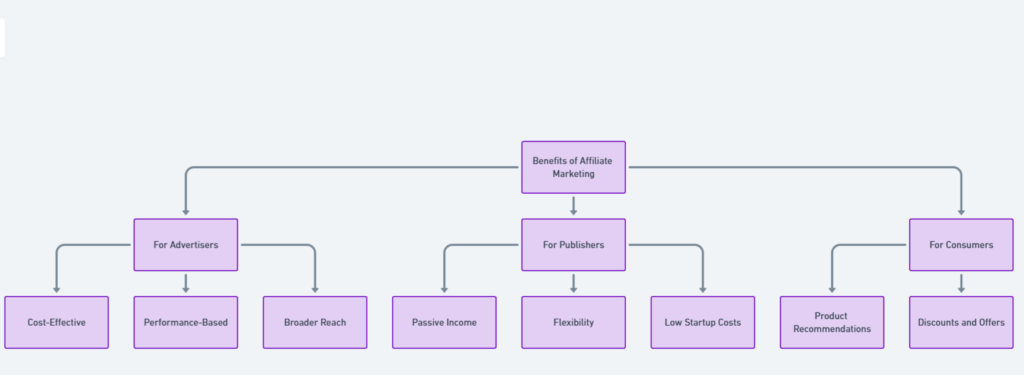
Introduction
Affiliate marketing is a performance-based marketing strategy where businesses reward affiliates (partners) for driving traffic or sales to their products or services through the affiliate’s marketing efforts. This comprehensive guide will delve into the intricacies of affiliate marketing, its benefits, and practical steps to get started, all while maintaining a keyword density of 1.5%.
Understanding Affiliate Marketing
Affiliate marketing involves four key players: the merchant (business selling the product), the affiliate (marketer promoting the product), the consumer (customer), and sometimes the network (a mediator managing affiliates). Here’s a breakdown of the process:
- Affiliate Joins a Program: An individual or business signs up for an affiliate program offered by a merchant. Popular affiliate networks include Amazon Associates, ShareASale, and CJ Affiliate.
- Unique Affiliate Links: The affiliate receives unique tracking links or codes to promote the merchant’s products or services.
- Promotion: The affiliate promotes the products or services through various channels such as blogs, social media, email marketing, and websites.
- Customer Purchase: A customer clicks on the affiliate’s unique link and makes a purchase on the merchant’s website.
- Commission Earned: The merchant tracks the sale through the unique link and pays the affiliate a commission for the sale or lead generated.

Benefits of Affiliate Marketing
- Low Start-Up Costs:
- You don’t need to create or stock products. Your main investment is time and effort in promoting the products.
- Passive Income:
- Once your content and links are up, they can generate income continuously without much additional work. A well-placed blog post, for example, can keep earning you commissions for months or even years.
- Flexibility and Convenience:
- You can work from anywhere and choose products that align with your interests or expertise, making it easier to create compelling content.
- Performance-Based Earnings:
- Your income is based on your performance, meaning the harder and smarter you work, the more you can earn.
- Diverse Income Sources:
- By joining multiple affiliate programs, you can create various streams of income, reducing reliance on a single source.
- No Customer Support:
- You don’t handle customer service issues. The merchant takes care of shipping, handling, and customer complaints.
- Scalability:
- With the right strategies, you can scale your affiliate marketing efforts to increase earnings. This could involve expanding your content, targeting new niches, or investing in paid advertising.

Steps to Start with Affiliate Marketing
Affiliate marketing can be a rewarding venture if approached strategically. Here’s a step-by-step guide to get you started:
- Choose Your Niche:
- Select a niche that interests you and has a good market demand. Popular niches include health and wellness, technology, personal finance, and beauty.
- Research Affiliate Programs:
- Look for reputable affiliate programs that offer good commissions and have products or services that align with your niche. Some popular affiliate networks include Amazon Associates, ShareASale, and CJ Affiliate.
- Build a Platform:
- Create a website, blog, or social media presence where you can share content and include your affiliate links. For example, Wirecutter is a successful affiliate site that reviews products and provides affiliate links.
- Create Quality Content:
- Produce valuable and engaging content that attracts your target audience. This could be blog posts, reviews, tutorials, or videos. Look at Smart Passive Income for inspiration on quality content.
- Promote Your Content:
- Use SEO, social media, email marketing, and other strategies to drive traffic to your content. Backlinko offers excellent resources on SEO strategies.
- Track and Optimize:
- Use analytics tools to track the performance of your affiliate links and content. Optimize your strategies based on what’s working and what isn’t.
Deep Dive into Affiliate Marketing Strategies
To excel in affiliate marketing, you need to employ effective strategies that can drive traffic and conversions. Here are some advanced strategies to consider:
- SEO Optimization:
- Optimize your content for search engines to increase organic traffic. Use relevant keywords, meta tags, and high-quality backlinks to improve your rankings. For example, Moz provides comprehensive guides on SEO optimization.
- Content Marketing:
- Create high-quality, valuable content that resonates with your audience. This includes blog posts, videos, infographics, and more. Neil Patel is a great example of effective content marketing.
- Email Marketing:
- Build an email list and send regular newsletters with valuable content and affiliate links. Personalize your emails to increase engagement. Look at Mailchimp for email marketing tools and strategies.
- Social Media Marketing:
- Utilize social media platforms to promote your content and affiliate products. Engage with your audience and use paid advertising to reach a broader audience. Buffer provides tools and strategies for effective social media marketing.
- Paid Advertising:
- Invest in paid advertising such as Google Ads, Facebook Ads, and other PPC campaigns to drive targeted traffic to your affiliate offers.
- Influencer Partnerships:
- Collaborate with influencers in your niche to promote your affiliate products. Influencers can provide access to a larger audience and increase your credibility. Instagram is a popular platform for influencer partnerships.
- Webinars and Live Streams:
- Host webinars and live streams to educate your audience about specific topics and recommend affiliate products during the sessions.
Common Challenges in Affiliate Marketing
While affiliate marketing undoubtedly presents an array of lucrative opportunities, navigating through its complex landscape isn’t without its hurdles. Let’s delve into some of the most prevalent challenges faced by affiliate marketers and explore effective strategies to overcome them:
High Competition:
The realm of affiliate marketing is characterized by fierce competition, particularly within sought-after niches. In order to carve out your niche amidst the crowd, it’s imperative to hone in on a specific sub-niche and curate content that’s not only compelling but also distinctly unique. By offering a fresh perspective or addressing a gap in the market, you can effectively elevate your visibility and attract a loyal audience base.
Traffic Generation:
One of the foremost challenges encountered by affiliate marketers is the daunting task of driving substantial traffic to their content. Given the saturated online landscape, simply creating compelling content isn’t sufficient; proactive measures must be taken to ensure its visibility. Investing in robust Search Engine Optimization (SEO) strategies, harnessing the power of social media platforms for targeted marketing campaigns, and judiciously allocating resources towards paid advertising initiatives are indispensable tactics for amplifying your content’s reach and enticing prospective customers.
Conversions:
While a steady influx of traffic is undeniably desirable, the ultimate goal of any affiliate marketer is to convert this traffic into tangible sales. However, achieving favorable conversion rates is often easier said than done. To maximize your chances of conversion success, it’s imperative to leverage the art of persuasive copywriting to craft compelling narratives that resonate with your audience on a visceral level. Additionally, incorporating clear and compelling calls-to-action (CTAs) throughout your content, coupled with rigorous A/B testing methodologies, can provide invaluable insights into optimizing your conversion funnel and driving incremental sales.
Compliance Issues:
Navigating the intricate web of legal and ethical regulations governing affiliate marketing can be a veritable minefield for the uninitiated. From stringent disclosure requirements surrounding affiliate relationships to meticulously adhering to the terms of service stipulated by affiliate programs, ensuring compliance is non-negotiable. By staying abreast of the latest industry regulations and adopting a proactive approach towards compliance, you can mitigate the risk of potential legal repercussions and safeguard your reputation as a reputable affiliate marketer.
Maintaining Trust:
At the heart of any successful affiliate marketing endeavor lies the cultivation and preservation of trust with your audience. In an era characterized by rampant consumer skepticism, building a rapport founded on transparency and integrity is paramount. By meticulously vetting the products and services you choose to endorse, and offering candid, unbiased reviews that prioritize the interests of your audience above all else, you can foster a sense of trust and authenticity that transcends transactional relationships, ultimately fostering long-term loyalty and advocacy
Future Trends in Affiliate Marketing
The landscape of affiliate marketing is in a perpetual state of flux, with emerging trends and cutting-edge technologies reshaping its trajectory. Let’s explore some of the burgeoning trends that are poised to redefine the future of affiliate marketing:
Voice Search Optimization:
As voice-activated devices continue to proliferate, optimizing your content for voice search represents a compelling avenue for expanding your reach and enhancing user engagement. By tailoring your content to align with natural language queries, you can effectively cater to the evolving preferences of an increasingly voice-centric audience.
Artificial Intelligence:
The advent of Artificial Intelligence (AI) heralds a new era of sophistication within the realm of affiliate marketing, offering unparalleled capabilities in personalized marketing initiatives, predictive analytics, and the seamless optimization of user experiences. By harnessing the power of AI-driven algorithms, marketers can unlock invaluable insights into consumer behavior and preferences, thereby empowering them to craft hyper-targeted campaigns that resonate with their audience on a profound level.
Influencer Marketing:
Influencer marketing is poised to retain its prominence within the affiliate marketing landscape, with social media platforms such as Instagram and YouTube serving as veritable breeding grounds for influencer-brand collaborations. Leveraging the aspirational appeal and relatable charisma of influencers, marketers can effectively leverage their social currency to amplify brand visibility, foster authentic connections, and drive meaningful engagement with their target audience.
Video Content:
The burgeoning popularity of video content underscores its pivotal role as a cornerstone of contemporary affiliate marketing strategies. By harnessing the emotive power of visual storytelling, marketers can captivate audiences, evoke visceral responses, and forge genuine connections that transcend traditional advertising tropes. From immersive product demonstrations to compelling brand narratives, the possibilities for leveraging video content as a potent marketing tool are virtually limitless.
Mobile Optimization:
With the pervasive ubiquity of mobile devices permeating every facet of modern life, optimizing your content and digital assets for mobile compatibility is no longer a mere option—it’s an imperative. By prioritizing mobile optimization initiatives, marketers can ensure seamless accessibility across a myriad of devices and platforms, thereby enhancing user experiences and bolstering conversion rates in an increasingly mobile-centric landscape.
Blockchain and Affiliate Transparency:
The integration of blockchain technology holds immense promise for revolutionizing the realm of affiliate marketing, offering unparalleled levels of transparency, security, and trust. By leveraging blockchain’s inherent immutability and decentralized architecture, marketers can engender greater confidence among consumers by providing verifiable records of transactions and commissions, thereby mitigating concerns surrounding fraud and fostering a culture of transparency and accountability within the affiliate ecosystem.
Case Studies of Successful Affiliate Marketing Websites
Examining successful affiliate marketing websites can provide valuable insights into effective strategies and approaches. Here are a few noteworthy examples:
- The Wirecutter:
- Acquired by The New York Times, The Wirecutter is a leading affiliate site that provides in-depth reviews and recommendations on a wide range of products. Their success lies in their thorough testing and unbiased reviews, which have built significant trust with their audience.
- NerdWallet:
- NerdWallet offers financial advice and product recommendations, particularly in credit cards, loans, and personal finance. Their detailed guides and comparison tools help users make informed decisions, driving high affiliate conversions.
- Smart Passive Income:
- Created by Pat Flynn, Smart Passive Income provides resources and courses on building online businesses, including affiliate marketing. Pat’s transparent income reports and engaging content have garnered a loyal following.
- Backlinko:
- Backlinko, founded by Brian Dean, focuses on SEO training and resources. Brian’s actionable SEO tips and in-depth guides attract a large audience, leading to successful affiliate partnerships.
Advanced Affiliate Marketing Techniques
To further enhance your affiliate marketing efforts, consider these advanced techniques:
- A/B Testing:
- Conduct A/B tests on your landing pages, emails, and calls-to-action to determine what resonates best with your audience and drives the most conversions.
- Retargeting Campaigns:
- Use retargeting ads to re-engage visitors who have previously interacted with your site but did not convert. Platforms like Google Ads and Facebook Ads offer retargeting options.
- Conversion Rate Optimization (CRO):
- Focus on improving your website’s conversion rates through CRO techniques, such as simplifying your checkout process, enhancing page load speed, and ensuring mobile-friendliness.
- User-Generated Content:
- Encourage your audience to create content, such as reviews and testimonials, which can increase trust and authenticity. Feature this content on your site to enhance credibility.
- Affiliate Marketing Tools:
- Utilize tools like ThirstyAffiliates, Pretty Links, and Affise to manage your affiliate links, track performance, and optimize your campaigns.
How to Maintain Compliance in Affiliate Marketing
Staying compliant with legal and ethical standards is crucial in affiliate marketing. Here are some tips to ensure compliance:
- Disclose Affiliate Relationships:
- Always disclose your affiliate relationships clearly and conspicuously. This builds trust with your audience and complies with regulations, such as the FTC guidelines in the United States.
- Follow Affiliate Program Terms:
- Adhere to the terms and conditions of each affiliate program you join. Violating these terms can result in account suspension or termination.
- Respect Privacy Laws:
- Comply with privacy laws, such as GDPR and CCPA, when collecting and handling user data. Ensure your privacy policy is up-to-date and transparent.
- Avoid Misleading Claims:
- Be honest and transparent in your promotions. Avoid making exaggerated or false claims about the products or services you promote.
Tools and Resources for Affiliate Marketers
Leveraging the right tools and resources can streamline your affiliate marketing efforts and boost your success. Here are some essential tools and resources:
- Google Analytics:
- Track your website traffic, user behavior, and conversions to optimize your marketing strategies.
- SEMrush:
- Conduct keyword research, analyze competitors, and track your SEO performance with this comprehensive tool.
- Ahrefs:
- Use Ahrefs to monitor backlinks, analyze your website’s SEO, and explore new content ideas.
- Mailchimp:
- Manage your email marketing campaigns, build your subscriber list, and send targeted newsletters with Mailchimp.
- Canva:
- Create visually appealing graphics, social media posts, and marketing materials with this easy-to-use design tool.
- ThirstyAffiliates:
- Manage and cloak your affiliate links, track clicks, and optimize your affiliate marketing efforts with ThirstyAffiliates.
- BuzzSumo:
- Discover trending content, analyze competitors, and identify influencers in your niche with BuzzSumo.
Building a Long-Term Affiliate Marketing Strategy
To ensure long-term success in affiliate marketing, it’s essential to develop a sustainable strategy. Here are some key components:
- Content Planning:
- Create a content calendar to plan and organize your content production. Focus on creating evergreen content that remains relevant over time.
- Audience Engagement:
- Foster a strong relationship with your audience by engaging with them through comments, social media, and email newsletters. Listen to their feedback and adjust your strategies accordingly.
- Diversify Income Streams:
- Don’t rely solely on one affiliate program or product. Diversify your income streams by promoting multiple products and joining different affiliate networks.
- Continuous Learning:
- Stay updated with industry trends, attend affiliate marketing conferences, and participate in online courses to enhance your skills and knowledge.
- Analyze and Adapt:
- Regularly analyze your performance metrics and adapt your strategies based on what’s working and what isn’t. Be flexible and open to trying new approaches.
Conclusion
Affiliate marketing is a powerful way to generate income online, especially if you have a niche audience and the ability to create engaging content. By understanding the basics and benefits of affiliate marketing, you can leverage this strategy to build a sustainable source of passive income. Whether you’re a medical professional looking to diversify your income or a blogger wanting to monetize your site, affiliate marketing offers a flexible and rewarding opportunity. Implementing the right strategies and staying updated with industry trends can help you succeed in this competitive field.

